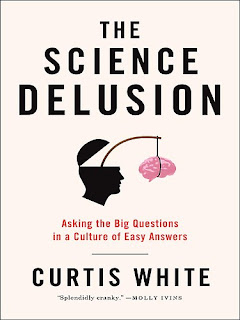In The Science
Delusion Curtis White, well-known author of The Middle Mind and other works of social criticism, takes on the outlandish
pretensions of the scientific community
with regard to the significance of their discoveries. Leaving aside the
physicists who believe they will soon know everything, more or less, because
they’ll know what it’s made of, White reserves his criticism for another group—the
neuroscientists and geneticists who are confident that once they “map” the
brain and genome, we’ll know everything we need to know about what it means to
be human.
To judge from the title alone, White seems also to be
attempting a counterthrust to atheistic arguments for the all-encompassing
reach of science on the order of Richard Dawkins’ The God Delusion. Yet he’s not much interested in defending
traditional religious doctrines. The troops he masses in defense of his
position come largely from the battalion of nineteenth-century Romantics—Byron,
Shiller, Schelling, Hegel, and even Nietzsche—all of whom had important things
to say about what scientific investigation can and cannot reveal.
It’s refreshing to read a book written by a thinker with more
than a superficial grasp of the West’s long intellectual tradition. All the
same, I wish he’d shaped the book differently, and perhaps called it The Defense of Poetry, following in the tradition
of Sir Phillip Sydney, Shelley, and Benedetto Croce.
White’s core argument is that many aspects of
human experience can be captured far more effectively through art, literature, poetry,
and even metaphysics, than by generic models of how “the brain,” for example,
works. He spends a little too much time, it seems to me, punching holes in the
claims of Damasio, Seung, and other
neuroscientists, and not quite enough mustering his own views into a coherent
and compelling statement. But maybe I feel that way because I already accept
his criticisms of scientific rhetoric and therefore find the arguments he
presents along those lines slightly tedious; while his distillation of Schiller’s
views on the ego, for example, strike me as far more interesting.
Among the points White returns to repeatedly, and with good
reason, is that the jargon scientists use to describe their studies is almost
invariably metaphoric rather than scientific. It’s considered a great
journalistic gift to convey a complex scientific principle in language that
comes alive for the common reader, but such language almost invariably
falsifies the nature of the research and exaggerates its significance.
White also exposes the close connection between scientific research
and the oligarchic establishment that supplies its funding. The scientific juggernaut is a huge
and expensive one, and its number one obsession isn’t truth, but survival at
any cost.
White is determined to write a truly “popular” book on a
seemingly arcane subject, and therefore avoids the strict analysis that would
reduce his thesis to a few pages and undercut its sales. That line of reasoning
would begin by observing that scientific research deals with “types” of things,
whether it be neutrinos or gnats, molecular compounds or magnolia warblers. But
the things that matter most in life—the things in which we take the most
interest—are individual things, rather than types of thing. Science
generalizes, thus allowing it to develop generic principles that are often,
though erroneously, described as “laws,” while the subtlety and complexity of individual
things slip through its fingers.
Let me give you a few examples.
Harold McGee’s On Food
and Cooking is a fascinating compendium of information on food chemistry.
But the effect of reading it bears no relation to the act of eating a bowl of
mussels Meuniere at the Smack
Shack downtown.
The impact of reading a sociological treatise on race
relations is altogether different from that of reading The Bonfire of the Vanities, To
Kill a Mockingbird, or Black Like Me.
A study of pheromones is an entirely different kettle of
fish from the act of falling in love.
Hence the importance of poetry,
literature, history, and personal experience, in bringing substance and truth
to our world-view.
But for science to miss the truth of things is one thing.
Far worse, according to White, is when it denies the very existence of the things it lacks the tools to analyze. Such hubris,
of which White offers plenty of examples, is nothing less than revolting.
In the end, White’s book reads much like a Romantic tract
that Rousseau or Schelling might have written—flashes of illumination and lot of
good quotations delivered scattershot along with a series of more or less random
assaults on the pretensions of the men in the lab coats with all the money, who
try to tell us how we think and feel—or that we don’t really feel at all.
We need more books like this. (Maybe with a better cover.)
For a slightly different slant on the same subject, check out this series of essays by Terry Eagleton.
For a slightly different slant on the same subject, check out this series of essays by Terry Eagleton.






No comments:
Post a Comment